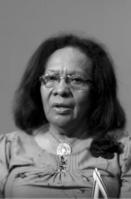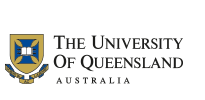Jean Kekedo

Jean Kekedo was a senior public servant and diplomat, and one of the first women to be accepted into the University of Papua New Guinea. In this interview she reflects on her experiences in administration, the challenges faced by women, the transition to independence and the changes and challenges after independence. In one sense, her own journey to become High Commissioner to the UK mirrors that of her country, in that, the real purpose of independence enables a country to deal directly with international countries on an equal footing.
| Time | Summary | Keywords |
|---|---|---|
| 00:00:00 |
Jean Kekedo is welcomed to the interview. |
|
| 00:00:49 |
Jean Kekedo traces her early schooling beginning in a humble primary school in Kokoda, and her 75 mile travel to school in Grade 4 in Popondetta where she established gardens for her food. She describes winning an Australian government scholarship to St Mary's in Charters Towers, Queensland, attended by her two elder sisters, which she declined in favour of Rabaul High School. |
Kokoda, Kumusi River, Popondetta, Rabaul High School, Rose Kekedo, Sangara |
| 00:08:52 |
Jean Kekedo recalls that she left high school with the leaving certificate in 1965 and won a scholarship to university which she declined. She states that she made two applications - to be either a patrol officer and to study agriculture, both of which women were barred from. |
agriculture, Department of Agriculture, discrimination, status of women, women |
| 00:11:28 |
Jean Kekedo recalls that the only position she was offered by the District Administration was as a welfare officer. She recollects that her first posting was in Milne Bay where she was mentored by Dame Alice Wedega. |
Ahioma, Alice Wedega, John Keith McCarthy, Milne Bay, welfare officer |
| 00:12:56 |
Jean Kekedo recalls her posting to Popondetta in 1968 to work with Phyllis Clarkson. She relates a story about being on patrol on the Kokoda Trail without sufficient warm clothing and the lesson it taught her. |
Kokoda Trail, Phyllis Clarkson, Popondetta |
| 00:17:07 |
Jean Kekedo discusses how she was encouraged to apply for university and was accepted in 1969. She recalls she was then selected to attend university in Australia which she found very difficult and determined not to do a higher degree or become an academic. |
university, University of Papua New Guinea, University of South Australia, Winifred Kamit |
| 00:20:01 |
Jean Kekedo discusses the rural areas of PNG and strategies used to prevent the spread of diseases. |
human development, rural areas, typhoid |
| 00:21:40 |
Jean Kekedo discusses the challenges of being a woman in PNG, including the lack of access to jobs like agriculture and engineering. She cites the influence of western society in gendering these jobs, despite women having a long tradition of planting and harvesting. |
agriculture, discrimination, status of women, women |
| 00:22:25 |
Jean Kekedo discusses the lack of opportunities for women, and the recent problems of domestic violence. |
domestic violence, violence, women |
| 00:23:32 |
Jean Kekedo discusses the fight for equal pay for equal work, the role of her sister Rose Kekedo in the teacher's union and the discrimination in housing and pensions. |
Buri Kidu, discrimination, equal pay, housing, Michael Somare, pensions, Rose Kekedo, status of women, teachers union, women |
| 00:26:18 |
Jean Kekedo discusses the need for university graduates prior to independence and her immediate appointment in 1973 as Director of Village Development. She describes how within six months she was appointed deputy head of the Prime Ministers Department and discusses her administration skills learnt from the Australian administration. |
administration, independence, Prime Ministers Department, university, Village Development |
| 00:29:08 |
Jean Kekedo discusses the Australian preparation for PNG's independence and their departure. She bemoans the decline in living standards. |
Australia, independence, Kiaps, living standards, Phyllis Clarkson |
| 00:33:54 |
Jean Kekedo comments on Australian preparations for independence and the role of administrators and reflects on her role as a change manager in various departments and agencies. She discusses her turbulent relationship with the minister while managing director of Forestry. |
administration, Civil Aviation, Forests, independence, Philip Bouraga, Post Courier, World Bank |
| 00:37:33 |
Jean Kekedo discusses the Australian contribution in administration, particularly advisers and understudies. She reflects on the increasing restrictions on administators and the growth of political interference. |
administration, Australia |
| 00:40:43 |
Jean Kekedo discusses being sent to Australia after independence and the role of mentorship. |
administration, Australia, Buri Kidu, Mark Lynch, Philip Bouraga, treaties |
| 00:43:41 |
Jean Kekedo discusses her access to Cabinet papers and the security of official documentation. |
Forests |
| 00:45:49 |
Jean Kekedo discusses the inequalities in pensions and her decision to keep her maiden name. |
Alice Wedega, Buri Kidu, pensions, Rose Kekedo, teaching, women |
| 00:48:45 |
Jean Kekedo discusses the importance of information sharing within the administration. |
administration |
| 00:50:16 |
Jean Kekedo discusses her time in and appointment as Secretary in the Civil Aviation Department, and her reasons for not seeking a second term as ombudsman. She relates how she provided the department with their budget. |
budget, Civil Aviation, Nahau Rooney, ombudsman |
| 00:56:24 |
Jean Kekedo discusses her work in the Civil Aviation Department in 1986, the role of her team and improving wages for technical workers. |
Civil Aviation, wages |
| 00:59:02 |
Jean Kekedo discusses air safety issues and the training of pilots. |
Civil Aviation, Vilimon Romney, Wilson Sagati |
| 01:01:18 |
Jean Kekedo discusses her time in Australia learning about Cabinet decisions and file keeping in the Prime Minister's Department and later attempts to restructure the department. |
Australia, Frederick Reiher, Gang of Four, Prime Ministers Department |
| 01:05:15 |
Jean Kekedo discusses the changes in the public service that came with independence, and after. |
independence, public sector |
| 01:08:18 |
Jean Kekedo discusses the changes in the public service and the payment of allowances. |
Kiaps |
| 01:12:43 |
Jean Kekedo discusses her appointment as High Commissioner to the United Kingdom, the protocols involved and her responsibilities. |
International Maritime Organisation, Mekere Morauta |
| 01:17:27 |
Jean Kekedo outlines the changes she oversaw during her time as High Commissioner including visa changes, access to the military and working holidays. |
Queen Elizabeth II |
| 01:22:20 |
Jean Kekedo is thanked for her contribution. |
|
| 01:22:43 |
Interview ends. |
Biography

Jean Kekedo
Jean Lucilla Kekedo OBE served as a senior public servant and diplomat for over 40 years. She was one of the first women to be accepted into the University of Papua New Guinea.
Her parents, from Milne Bay, had been sent to Kokoda in Oro Province after World War II. She attended the primary school where her mother taught before travelling to school in Popondetta after Grade 4. Choosing not to follow her two elder sisters Rose and Cecily to high school in Charters Towers Queensland, she attended Rabaul High School where she graduated with the leaving certificate in 1965. Disappointed to not be allowed to become a patrol officer or study agriculture, she was appointed as a welfare officer serving women in the field from her base in Popondetta. She accepted a position at UPNG in 1969, before taking up an offer to study at the University of South Australia where she graduated with a degree in social work.
Returning to PNG prior to independence, she was among a group of much sought after graduates to take up positions in the public service. Her career in administration began as Director of Village Development, before being invited to become Deputy Head of the Prime Ministers Department. She also served as Managing Director of Forestry (until 1995), Ombudswoman (1982-1986), and Secretary of the Civil Aviation Department. Married with three children, she retained her maiden name throughout her career. She was appointed as PNG’s High Commissioner to the United Kingdom in June 2002.
Copyright © Papua New Guinea National Museum & Art Gallery, 2025
The copyright holder of this material grants users permission to access the material on this website for the following purposes only: research and study, education, other non-commercial and non-public uses.




